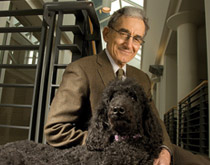
For 22 years, Ronald Makay sold cut flowers at an open-air booth in Pittsburgh’s Strip District, where thousands of shoppers flood the streets each weekend to buy fresh produce, meats, cheeses, and wholesale goods. Every Saturday morning, the flower vendor would expect a visit from Carnegie Mellon economics professor Lester B. Lave, who placed his order and then strolled through the warren of shops and outdoor markets to pick up his weekly provisions. Often he was joined by his wife, Judith; their twin children, Tamara and Jonathan; and his black standard poodle. It didn’t matter if it was pouring rain or if snow carpeted the streets. Lave went to The Strip each Saturday morning and always left with a bouquet of colorful blooms—usually Peruvian lilies—to place on the piano in his family room.
Makay enjoyed chatting with his regular customer. In recent years, he shared with him the hard knocks of life in the cut-flower business. It used to be that people could only buy flowers from street vendors or a local florist. Slowly, though, flowers became available in almost every grocery store and discount retail chain, not to mention online sales. With so much competition, it was becoming harder for Makay to eke out a living, and after more than two decades, he considered closing up his flower operation and starting a landscaping company.

One Saturday morning, he decided to run the idea past Lave, thinking the economics expert might have some advice. Lave considered the problem and gave more than just his opinion. He volunteered to be one of Makay’s first customers and to recommend the company to his friends if the work was done well. But it would be a risky move, Lave cautioned, as many small businesses fail and entrepreneurship is rarely forgiving.
As a leading environmental economist, Lave—who died at age 71 last May after a four-month struggle with cancer—knew more than almost anybody in the world about risk analysis. He spent most of his career using tools from this field to study problems that affect the lives of millions—from air pollution and cancer testing to climate change and highway safety. Add to that list dam safety, fuel additives, diabetes in truck drivers, dependence on foreign oil, and electrical power. “The world has been changed by Lester Lave’s work, a claim that not many can make,” says Carnegie Mellon Provost and Executive Vice President Mark Kamlet.
Lave began laying stake to this claim soon after joining the business faculty at Carnegie Mellon in 1963. Earlier that year, he had earned his PhD in economics from Harvard at the age of just 23. He and his brother were the first in the family to graduate from college, both attending Reed College in Oregon. Their father dropped out of school after seventh grade and later ran a grocery store and laundry in southern California. Their mother finished high school. “Because of his childhood, my dad was always able to see beyond someone’s pedigree and had this strong sense that everybody has dignity and really believed that everybody should have opportunities,” says Tamara Rice Lave, an associate professor of law at the University of Miami.
Pausing to fight back tears reminiscing about her dad, she proudly recounts how he provided a generous loan to her good friend—now a breast cancer surgeon—so she could afford extra science courses required for application to medical school. “He was always willing to do what he could to help people,” his daughter says.
One of Lave’s former PhD students, H. Scott Matthews, a professor of civil and environmental engineering at Carnegie Mellon, says he is still trying to figure out how his mentor always managed to help students who came knocking, even though there were pressing demands on his time. “I feel an electric shock when I close my office door to get something done, as if I am breaking the rules,” Matthews says.
He and other colleagues note that Lave was never afraid to break the rules or take his own risks by challenging conventional wisdom if the data led him in that direction, even if powerful interests were at stake. That first became clear in 1970, when Lave and doctoral student Eugene Seskin used statistical methods to demonstrate that air pollution in American cities was causing a significant increase in death rates. The findings, published in the journal Science, made the up-and-coming young economist a public enemy of industrial polluters, the Nixon administration, and later the Reagan administration; but the findings came to serve as a key early basis for federal regulations to improve air quality.
“Energy and environmental science in the academic world is afflicted with true believers,” says David Keith, a University of Calgary climate scientist who worked closely with Lave as a post-doctoral researcher at Carnegie Mellon. “So many people around us already ‘know’ what the answer is. But the real world is more complicated than any of us wants to admit, and Lester was really gifted at balancing his drive to help improve the world while holding fast to the ideals of dispassionate, rigorous analysis.”
At the same time Lave was studying the health effects of air pollution, he embarked on what would become a career-long body of research on the electric power industry. And, in collaboration with his wife, a professor of health economics at the University of Pittsburgh, he published a series of papers about medical care costs and efficiency. But he was perhaps best known for developing an economy-wide approach to “life-cycle assessment” that called for the need to look at the environmental impact of a product from cradle to grave. For instance, a study conducted with Carnegie Mellon colleagues Chris Hendrickson and Francis McMichael showed that recycling lead-acid batteries from electric cars would release more lead than if the cars burned lead gasoline. Although vigorously disputed (including catcalls from industry that “Lave et al.” didn’t understand basic scientific principles), the study’s results were later vindicated, leading to a better understanding of how to design truly eco-friendly cars.
“Lester was always really interested in real-world problems,” Judith Lave says. “And he flourished in the kind of environment that Carnegie Mellon offered to him, which doesn’t require people to follow straight and narrow paths. It allows them to experiment and explore and work across departments.”
Lave, an economics professor at the Tepper School of Business, was also a self-taught engineer with an adjunct appointment in the Department of Engineering and Public Policy. About once a decade, his curiosity (and self-professed impatience) would lead him to dive into a new technical problem, learning as much about the physics, chemistry, and engineering underlying the systems he was studying as the specialists trained in those fields knew.
Hendrickson, himself a distinguished engineer, recently elected to the National Academy of Engineering, recalls, “Whenever Lester would lean back in his chair and say, ‘Well, I’m not an engineer, but…’—that’s when you really started paying attention.”
Lave could be brutally honest but always delivered any critique in a gentle manner, his colleagues and students agree. “The more devastating the criticism, the lighter the hand has to be,” he once wrote in a trademark pithy “Lesterism.” “The object is not to bludgeon the person, but rather to remove their guts so that they don’t notice.”
For the last 15 years, Lave devoted much of his attention to helping launch and run Carnegie Mellon’s Green Design Institute, which seeks environmentally acceptable ways to make, use, recycle, and dispose of products. In 2001, he also co-founded the University’s Electricity Industry Center, the largest research group of its kind focused on the power industry. In these endeavors, engineers and scientists work alongside economists and public policy experts, and Lave often served as the bridge linking the separate disciplines.
He and his wife have kept those connections alive by establishing a $3 million endowed fund for the Lester and Judith Lave professorship in economics, engineering, and public policy. The holder of the new faculty chair will have a strong background in engineering or the natural sciences and a doctorate in economics with a special interest in public policy issues. The Laves have also provided a $500,000 estate gift for a fellowship in their name to support PhD students in those areas. “These gifts were Lester’s way of ensuring the kind of work that he loved and thought was very important would be supported and would continue,” Judith Lave says.
Lave certainly had tireless passion for his work. “We had to remove him from the classroom to take him to the first doctor visit that ended with his hospitalization,” his wife says. And even from his hospital bed, just days before his death, Lave insisted on dictating revisions to a report for the National Research Council on energy efficiency.
Over the years, Lave had refined a classic dissertation defense question in the Department of Engineering and Public Policy asking students what they would tell an important person in an elevator about their research if they had only a minute to speak. After his passing, a call was put out to the academic community for “elevator speeches.” What would you say to Lave if you could have one more minute of his time?
The responses filled 16 single-spaced pages of a memorial tribute book, running the gamut from poignant to humorous, philosophical to deeply personal. “Lester, you’ve taught all of us a simple, elegant message that we will all pass on to others: ‘Work on problems that matter,’” one former student wrote.
Had Ronald Makay, the Strip District florist, written his “elevator speech,” he likely would have thanked Lave for the vote of confidence that inspired him to launch his landscaping business, aptly named, Your Flower Guy. “He gave me a chance,” says Makay, who no longer struggles to make ends meet by selling flowers on the street. His business has flourished with several high-profile clients, but he still finds time every week to mow the lawn and maintain the property at the Lave house.
Jennifer Bails is an award-winning freelance writer. She is a regular contributor to this magazine.
Related Links:
Lester Lave's Legacy to Live On Through Professorship and Fellowship
Obituary: CMU Professor Lester Lave was a Leading Environmental Economist
Lester Lave - An Appreciation



